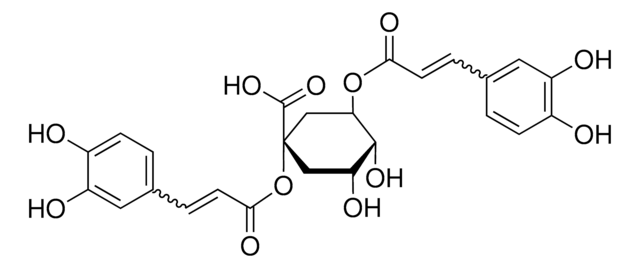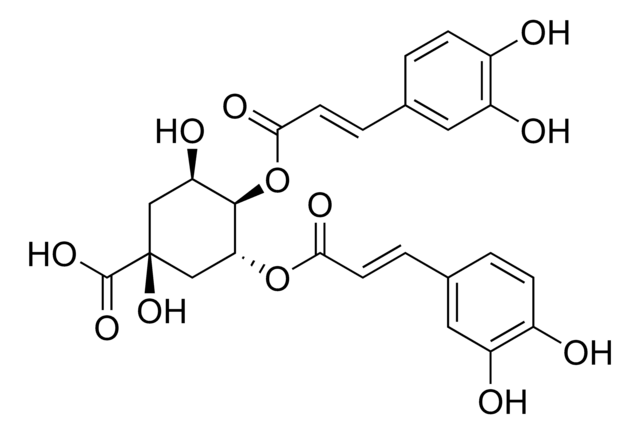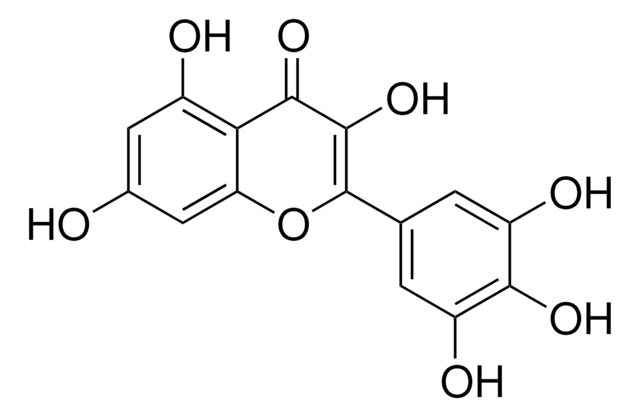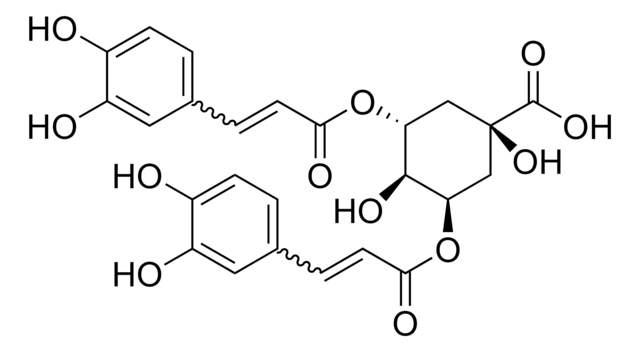SBR00002
Arzanol
from Helichrysum italicum, ≥98%
Synonyme(s) :
3-[[3-Acetyl-2,4,6-trihydroxy-5-(3-methyl-2-buten-1-yl)phenyl]methyl]-6-ethyl-4-hydroxy-5-methyl-2H-pyran-2-one
About This Item
Produits recommandés
Source biologique
Helichrysum italicum
Niveau de qualité
Essai
≥98%
Forme
powder
Application(s)
metabolomics
vitamins, nutraceuticals, and natural products
Température de stockage
−20°C
Chaîne SMILES
OC1=C(CC2=C(O)C(C)=C(CC)OC2=O)C(O)=C(C(C)=O)C(O)=C1CC=C(C)C
InChI
1S/C22H26O7/c1-6-16-11(4)18(24)15(22(28)29-16)9-14-19(25)13(8-7-10(2)3)20(26)17(12(5)23)21(14)27/h7,24-27H,6,8-9H2,1-5H3
Clé InChI
ZOIAPLVBZQQHCG-UHFFFAOYSA-N
Description générale
Application
Actions biochimiques/physiologiques
Arzanol inhibits the activation of inflammatory transcription factor NFκB, HIV replication in T cells, releases of IL-1β, IL-6, IL-8, and TNF-α,and biosynthesis of PGE2 by potentially inhibiting the mPGES-1 enzyme.
Arzanol inhibits the activation of inflammatory transcription factor nuclear factor-KB (NF-KB), human immunodeficiency virus (HIV) replication in T cells, releases of interleukin (IL)-1β, IL-6, IL-8, and tumor necrosis factor (TNF)-α and biosynthesis of prostaglandin E2 (PGE2) by potentially inhibiting the mPGES-1 enzyme. It also possesses antioxidant and cytotoxic activity.
Reconstitution
Code de la classe de stockage
11 - Combustible Solids
Classe de danger pour l'eau (WGK)
WGK 3
Point d'éclair (°F)
Not applicable
Point d'éclair (°C)
Not applicable
Faites votre choix parmi les versions les plus récentes :
Certificats d'analyse (COA)
Vous ne trouvez pas la bonne version ?
Si vous avez besoin d'une version particulière, vous pouvez rechercher un certificat spécifique par le numéro de lot.
Déjà en possession de ce produit ?
Retrouvez la documentation relative aux produits que vous avez récemment achetés dans la Bibliothèque de documents.
Notre équipe de scientifiques dispose d'une expérience dans tous les secteurs de la recherche, notamment en sciences de la vie, science des matériaux, synthèse chimique, chromatographie, analyse et dans de nombreux autres domaines..
Contacter notre Service technique







